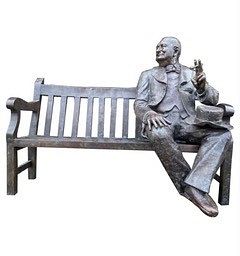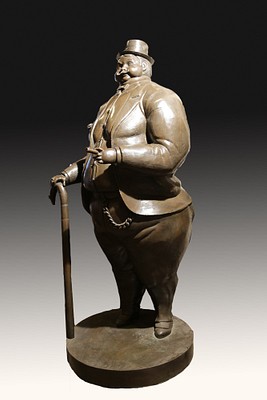20th Century Large Bronze Winston Churchill on a Bench
Lot 2014
About Seller
1stbid
232 E 59th St
New York, NY 20007
United States
1stbid is a leading auction house specializing in authentic antique and vintage hand-woven rugs, as well as a curated selection of objets d'art from around the world. Our collection is carefully hand-picked and assessed by proprietor Victor Mashihi, whose family has been in the business of selling r...Read more
Estimate:
$45,000 - $55,000
Absentee vs Live bid
Two ways to bid:
- Leave a max absentee bid and the platform will bid on your behalf up to your maximum bid during the live auction.
- Bid live during the auction and your bids will be submitted real-time to the auctioneer.
Bid Increments
| Price | Bid Increment |
|---|---|
| $1,000 | $100 |
| $2,000 | $150 |
| $5,000 | $250 |
| $10,000 | $500 |
| $20,000 | $1,000 |
| $30,000 | $2,000 |
| $50,000 | $5,000 |
| $100,000 | $10,000 |
About Auction
By 1stbid
Jun 5, 2022
Set Reminder
2022-06-05 14:00:00
2022-06-05 14:00:00
America/New_York
Bidsquare
Bidsquare : Rarities from Around the World. Finest Rugs & Art including NFTs at NO Extra Charge
https://www.bidsquare.com/auctions/fine-rugs-of-chevy-chase/rarities-from-around-the-world-finest-rugs-art-including-nfts-at-no-extra-charge-9344
Rarities from Around the World Finest Rugs & Art including NFTs at NO Extra Charge. 1stbid info@1stbid.com
Rarities from Around the World Finest Rugs & Art including NFTs at NO Extra Charge. 1stbid info@1stbid.com
- Lot Description
This is an stunning larger than a life-size vintage statue of the Prime Minister of the United Kingdom from 1940 to 1945, Winston Churchill, in a relaxed and informal way on an outdoor bench, dating from the second half of the 20th century. This spectacular statue is made from solid bronze and weighs around a third of a ton. It features the former British Prime Minister seated on the bench with his head slightly right-hand-turned and sympathetically smiling. He is dressed in an elegant suit with his eyes caught in a content mood, probably enjoying the quiet moment of resting on the bench while smoking his cigar - indeed, Winston Churchill had a legendary love of cigars. This high-quality hot cast solid bronze was produced by using the traditional "lost wax" process, otherwise known as the "cire perdue" method. Given the exceptional size and high-quality intricate detailing, this outstanding statue will soon become the central point of your garden or outdoor space, and is sure to receive the most attention wherever it is placed. Condition: In really excellent condition, please see photos for confirmation. Dimensions in cm: Height 145 x width 174 x depth 111 Dimensions in inches: Height 57.1 x width 68.5 x depth 43.7 Winston Churchill was born on 30 November 1874, in Blenheim Palace, Oxfordshire and was of rich, aristocratic ancestry. Although achieving poor grades at school, his early fascination with militarism saw him join the Royal Cavalry in 1895. As a soldier and part-time journalist, Churchill travelled widely, including trips to Cuba, Afghanistan, Egypt and South Africa. Churchill was elected as Conservative MP for Oldham in 1900, before defecting to the Liberal Party in 1904 and spending the next decade climbing the ranks of the Liberal government. He was First Lord of the Admiralty (the civil/political head of the Royal Navy) by the time of the disastrous Gallipoli Campaign , which he created. Heavily criticised for this error, he resigned from this position and travelled to the Western Front to fight himself. The interwar years saw Churchill again ‘cross the floor’ from the Liberals, back to the Conservative Party. He served as Chancellor of the Exchequer from 1924, when he controversially opted for Britain to re-join the Gold Standard. Following the Tory electoral defeat in 1929, Churchill lost his seat and spent much of the next 11 years out of office, mainly writing and making speeches. Although he was alone in his firm opposition to Indian Independence, his warnings against the Appeasement of Nazi Germany were proven correct when the Second World War broke out in 1939. Following Neville Chamberlain’s resignation in 1940, Churchill was chosen to succeed him as Prime Minister of an all-party coalition government. Churchill, who also adopted the self-created position of Minister for Defence, was active both in administrative and diplomatic functions in prosecuting the British war effort. Some of his most memorable speeches were given in this period, and are credited with stimulating British morale during periods of great hardship. However, Labour leader Clement Attlee’s unexpected General Election victory in 1945 saw Churchill out of office and once again concentrating on public speaking. In his 1946 speech in the USA, the instinctive pro-American famously declared that “an iron curtain has descended across the Continentâ€, and warned of the continued danger from a powerful Soviet Russia. By his re-election in 1951, Churchill was, in the words of Roy Jenkins, “gloriously unfit for officeâ€. Ageing and increasingly unwell, he often conducted business from his bedside, and while his powerful personality and oratory ability endured, the Prime Minister’s leadership was less decisive than during the war. His second term was most notable for the Conservative Party’s acceptance of Labour’s newly created Welfare State, and Churchill’s effect on domestic policy was limited. His later attempts at decreasing the developing Cold War through personal diplomacy failed to produce significant results, and poor health forced him to resign in 1955, making way for his Foreign Secretary and Deputy Prime Minister, Anthony Eden. Churchill died in 1965, and was honoured with a state funeral. Lost Wax Method sometimes called by the French name of cire perdue or the Latin, cera perduta is the process by which a bronze or brass high-quality from an artists sculpture. In Industrial uses, the modern process is called investment casting. An ancient practice, the process today varies from foundry to foundry, but the steps which are usually used in casting small bronze sculptures in a modern bronze foundry are generally quite standardized.
- Shipping Info
-
Please contact us ahead of any of our auctions regarding any available shipping options we may have. All shipping, packaging and handling costs are the responsibility of the bidder/purchaser/buyer.
-
- Payment & Auction Policies
-
Available payment options
-
- Buyer's Premium



 EUR
EUR CAD
CAD AUD
AUD GBP
GBP MXN
MXN HKD
HKD CNY
CNY MYR
MYR SEK
SEK SGD
SGD CHF
CHF THB
THB




